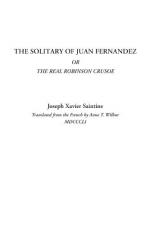Rendering full justice to the merit of the writer, we must nevertheless acknowledge that he has completely altered, in a mental view, the physiognomy of his model. Robinson is not a man suffering entire isolation; he has a companion, and the savages are incessantly making inroads around him. It is the European developing the resources of his industry, to contend at once with an unproductive land and the dangers created by his enemies.
Selkirk has no enemies to repulse, and he inhabits a fruitful country. He needs, before every thing else, the presence of man, one of those fraternal affections in which he refuses to believe. His sufferings originate in his very solitude. In solitude, Robinson improves and perfects himself; Selkirk, at first as full of resources as he, ends by becoming discouraged and brutified.
Which of the two is most true to nature?
The first is an ideal being, for in no quarter of the globe has there ever been found one analogous to the Robinson of De Foe; the other, on the contrary, is to be met with every where, denying the dependence of an isolated individual; but this dependence, even in the midst of a prodigal nature, if it is not to the honor of man, is to the honor of society at large.
Notwithstanding all that has been said, the solitary is a man imbruted, vegetating, deprived of his crown. ’Solitude is sweet only in the vicinity of great cities.’[1] By an admirable decree of Providence, the isolated being is an imperfect being; man is completed by man.
[Footnote 1: Bernardin de St. Pierre. Seneca had said: Miscenda et alternanda sunt solitudo et frequentia.]
Notwithstanding the false maxims of a deceitful philosophy, it is to the social state that we owe, from the greatest to the least, the courage which animates and sustains us; God has created us to live there and to love one another; it is for this reason that selfishness is a shameful vice, a crime! It is, so to speak, an infringement of one of the great laws of Nature.
THE END.
NEW BOOKS AND NEW EDITIONS
PUBLISHED BY TICKNOR, REED, AND FIELDS
* * * * *
HENRY W. LONGFELLOW
COMPLETE POETICAL WORKS [Transcriber’s Note: missing text.] the six Volumes mentioned below, and [Tr. Note: missing text.] the market. In two volumes, 16mo, $2.00
In separate Volumes, each [Tr. Note: missing text.] cents. VOICES OF THE NIGHT. BALLADS AND OTHER POEMS. SPANISH STUDENT; A PLAY IN THREE ACTS. BELFRY OF BRUGES AND OTHER POEMS. EVANGELINE; A TALE OF ACADIE[Tr. Note: missing text.] THE SEASIDE AND THE FIRESIDE. THE WAIF. A Collection of Poems. Edited by [Tr. Note: missing text] THE ESTRAY. A Collection of Poems. Edited [Tr. Note: missing text]
MR. LONGFELLOW’S PROSE WORKS HYPERION. A Romance. In one volume. price $1.00.




